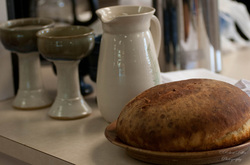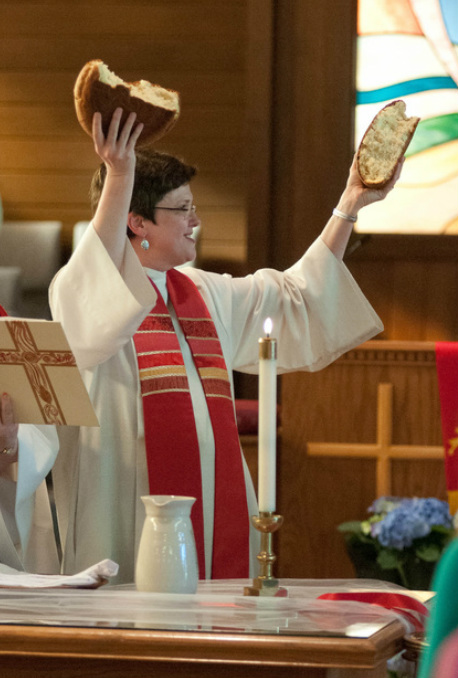 You've no doubt heard by now that the Session has authorized the celebration of weekly communion during the "extraordinary" times of our church year, the seasons of feasts and festivals—Advent and Christmas, Lent and Easter and the transitional Sundays around those seasons. In our understanding of the church year, extraordinary is contrasted with so-called "ordinary" time, those Sundays when the paraments are green, those Sundays in our yearly cycle that celebrate God's presence in the slow and steady-growth ordinariness of our life. Together the seasons alert us to the astonishing variety of ways we encounter the transforming presence of God in our lives.  For the coming liturgical year, then (beginning with the first Sunday in Advent, December 2), a shorthand way to tell whether we will be celebrating communion on a particular Sunday: whenever the chairs are in the round, we'll be at the table (in addition to those other first Sundays of the month, as has been our practice). The result will be that we'll celebrate communion roughly half the Sundays of the year. To the bulk of you who have hungered for quite some time for weekly communion, this will be good news. But the Session is aware in our discernment there are others who for a variety of reasons have reservations. The rest of this note is especially for you. First of all, I want to be clear about our theological tradition. Simply put, the shape of Reformed worship is incomplete when communion is not celebrated. The reformer John Calvin was clear on this point. We are called to be doers of the word, not just hearers. We hear the Word when it is proclaimed in the readings and sermon. But the Word is enacted at the font and table. We envision and embody how the Word is lived and what its implications are for our lives as we turn idea into action. The sacraments are embodied, engaged and justice-oriented actions that shape us for our life in the world. So, to say it again plainly, our worship is misshapen when we do not celebrate communion. It is logical, whole, and transformative when we do. We are recovering this understanding in this new time. Moreover, the Lord's Supper is a part of what the Christian community does and has done regularly not just since the Reformation, but for millennia. It has only been lost in recent generations when our practice at table became more like a funeral that only mourns the tragedy of Jesus' death at our sinful hands. Indeed these elements are not just "Christ's body broken" and "Christ's blood shed" but "the bread of heaven and the cup of salvation!" We have recovered this feast for what it truly is, the self-giving of God that enacts and enables our new life together in the Kingdom of God here and now. We encounter the wisdom of communion's transformative power again and again in scripture. The Emmaus story (Luke 24) is an example of Luke's theology of word and table that you have heard me cite before. The disciples hear Jesus teach the word while they are on the road, but it was in the breaking of the bread that their eyes were open (vs. 31). Acts 2:43-47 also reveals the pattern of practice of the early church: day by day the disciples met for worship at the Temple with a meal together in their homes afterwards. Paul's letter to the Corinthians (1 Cor. 11:20-33) shows the nature of these meals that you will no doubt recognize from our practice and our song: we eat together remembering Jesus and feeding others as we have been fed—in our mission we become Christ's body broken for the world. Luther, another reformer, once defined worship as the tenth leper turning back. You will recall the story in Luke 17 of the ten lepers who come to Jesus seeking healing. They all are healed, but only one returns to give thanks. The structure of the story in Luke 17 is actually the structure of traditional worship. According to the PCUSA blog Font & Table: We stand at a distance from God because of the disease of our sin. But we cry out, "Jesus, Master, have mercy on us" (vs. 13) in our confession of sin. Jesus speaks. We respond to the Word in obedience, and as we do so, we are healed, restored. The Greek verb here is the same as that used for catharsis, meaning cleansed, purged, released from an emotional burden. Only the leper who turns back to give thanks, though, is made whole. The Greek is most interesting here. The tenth leper doxologizes Jesus, falling prostrate before him, which is a worship stance and a position of obeisant loyalty before royalty. Then he gives thanks, eucharistéo, the same word we use for eucharist or holy communion. It is at this point that Jesus declares the leper whole, sozo, the word used for salvation. As we move toward more regular celebration of communion, I would encourage us all to trust the deep wisdom of this tradition of ours, which recognizes the power of the gospel as we enact it at the pulpit, table, and font.
If you've made it this far, you are either very committed to or pleased by this shift, or you are still concerned. So let me add this: Worship is always about our free response to our experience of God. If you have reservations, remember that you are always free to participate by not participating. Taking communion is no more mandatory than singing every verse of every hymn. If you don't hunger, for whatever reason, you don't have to come to the table. You are no less a part of Christ's body. Or if you wish, come with your arms crossed and receive a blessing rather than some bread. This, in fact, is another ancient practice for those who are in a season that calls for fasting. Sometimes our act of worship is giving generously to others within the community what we do not need ourselves. And as always, remember the promises made in baptism. We are one with one another not because we always agree, but because together we have what we cannot have alone, because we are members of Christ's body, not ourselves alone the body, because iron sharpens iron. Let's be in conversation as together we seek the Kingdom of God. Grace & Peace, Scott
0 Comments
Leave a Reply. |
Archives
June 2024
Categories
All
|

 RSS Feed
RSS Feed